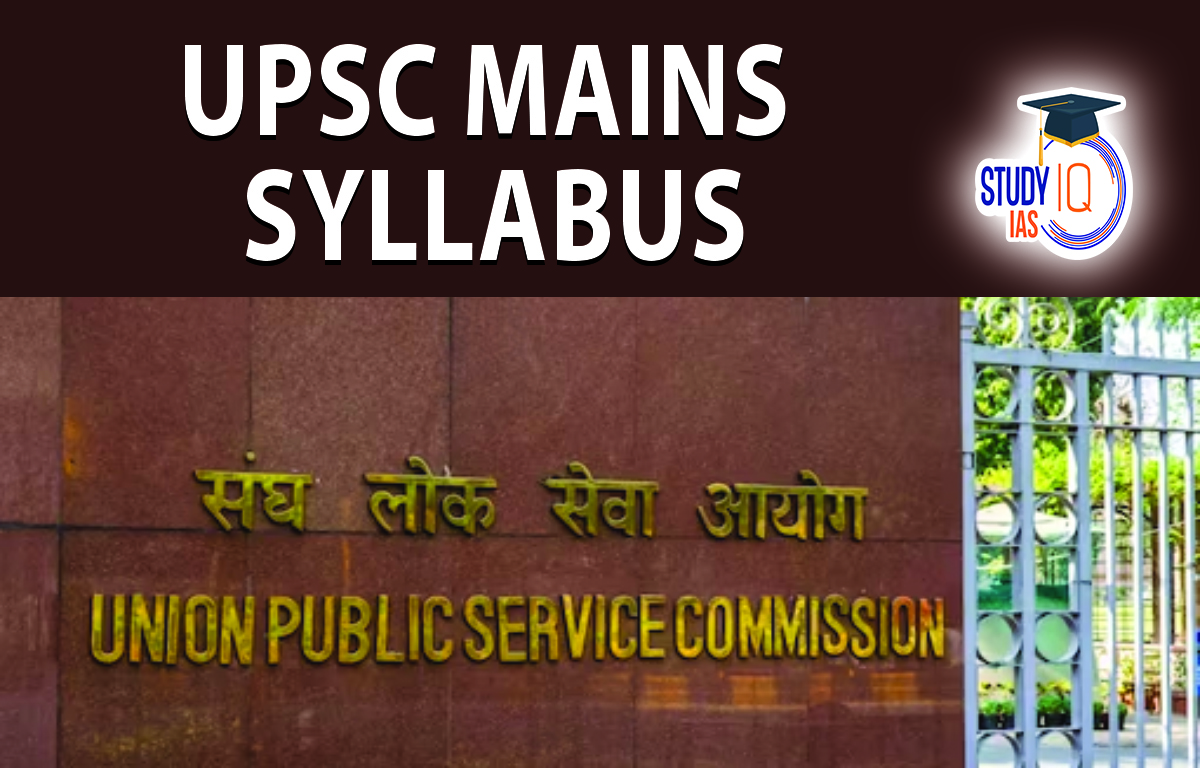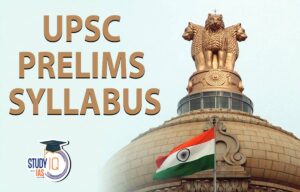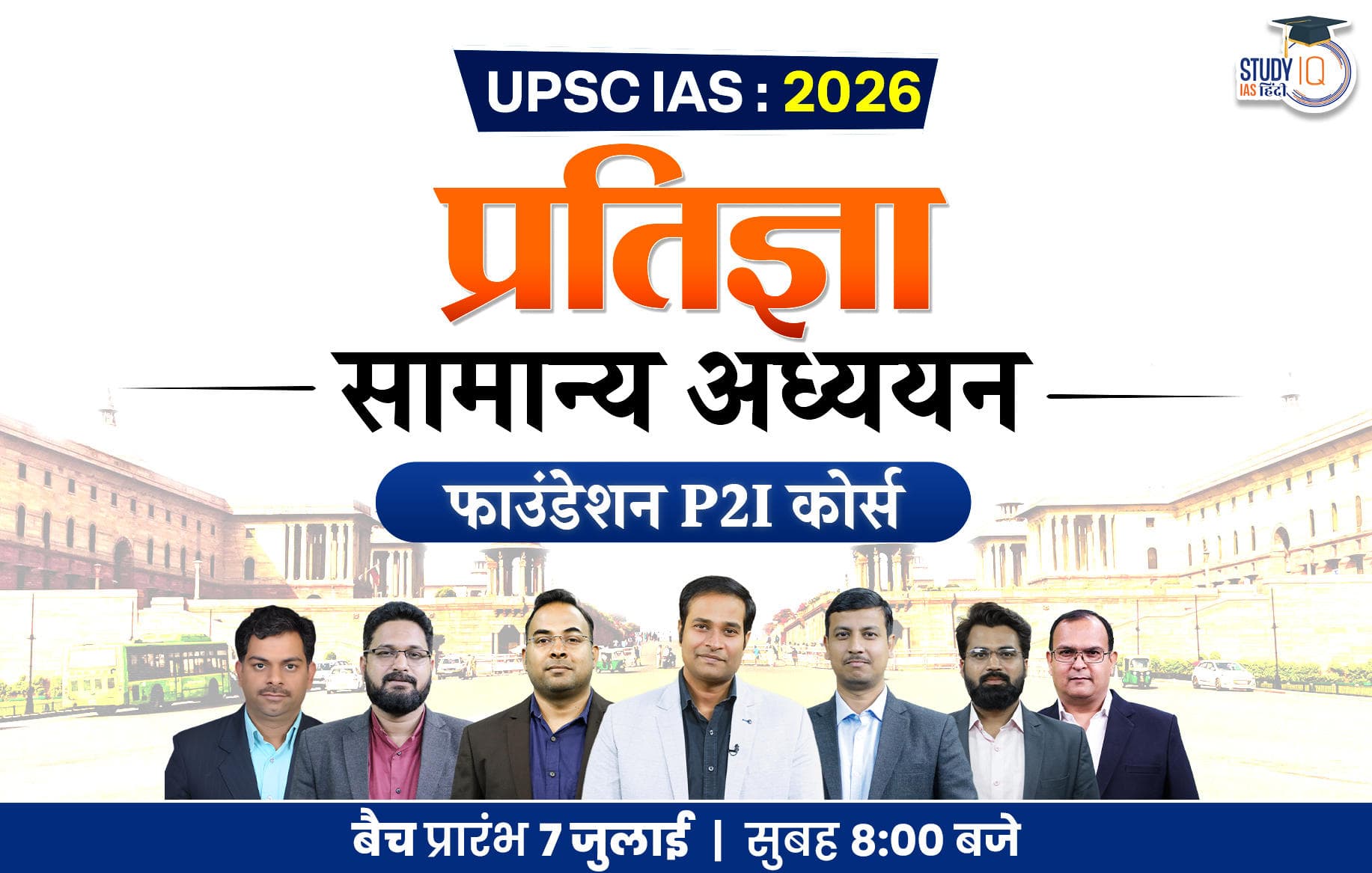Table of Contents
UPSC Mains Syllabus 2025 is a comprehensive guide for candidates aspiring to crack the Civil Services Examination, one of the most prestigious and competitive exams in India. UPSC Mains is the second phase of the selection process for UPSC Civil Service examinations. It outlines the various subjects and topics that candidates need to be well-versed in to succeed in the exam. Mains Syllabus 2025 has a vast coverage area. The Union Public Service Commission publishes the official notification on its website along with the UPSC Syllabus 2025.
UPSC Mains Syllabus 2025
UPSC Mains Syllabus 2025 has nine theory papers, including General Studies, electives, and essay writing topics. This information is crucial for applicants as they organize their study plans and schedule specific times for every subject. The written examination has nine conventional descriptive-style papers. In this article, we have provided the detailed syllabus of the main examination.
| IAS Mains Syllabus 2025 | |
| Category | UPSC Syllabus 2025 |
| Number of Papers | Nine |
| Types of Paper | Conventional Papers (Descriptive Type) |
| Duration of Exam | 3 hours Each Paper |
| Total Marks | 1750 |
| Language of Exam | English & Hindi (Except Language Paper) |
| Negative Marking | No negative marking but Penalty Marking for various mistakes made by candidates |
| Marks Counted in Merit | Yes |
| We’re now on WhatsApp. | Click to Join |
UPSC Mains Exam Pattern 2025
Candidates have to clear the Prelims exam to be eligible for the Mains Exam. The Mains exam assesses a candidate’s academic knowledge and capacity to effectively articulate their understanding following the question’s requirements within the allotted time. Candidates must be qualified for each paper as this is the stage of the exam procedure where scores and rankings are determined. One must obtain minimum passing marks in the nine Mains exam papers. Language papers, i.e., English and Indian Language papers, are qualifying papers, and the remaining papers, i.e., GS-I, GS-II, GS-III, GS-IV, Essay paper, Optional Paper 1, and Paper 2, will be graded.
Key Features of UPSC Mains Exam Pattern 2025
- Mode of Exam: Written (Pen and Paper)
- Type of Questions: Descriptive/Subjective
- Total Papers: 9 Papers
- Total Marks: 1750 Marks (not including the interview)
- Qualifying Papers: 2 Papers (Indian Language and English)
- Papers for Merit: 7 Papers (Essay, General Studies, and Optional Subject)
Qualifying Papers in UPSC Mains Exam
- Paper-A: One of the Indian languages listed in the Constitution’s Eighth Schedule must be selected by the candidate – 300 Marks
- Paper-B: English – 300 Marks
Papers Counted for Merit in UPSC Mains Exam
| Paper | Detail | Marks |
| Paper 1 | Essay Paper | 250 Marks |
| Paper 2 | General Studies I: General Studies Paper I consists mainly of the History and Geography of the World and Society, Indian Heritage, and Culture. This paper primarily revolves around History, Geography, and Society | 250 Marks |
| Paper 3 | General Studies II: General Studies Paper II mainly consists of Politics, Constitution, Governance, Social Justice, and International relations. | 250 Marks |
| Paper 4 | General Studies III: General Studies Paper III mainly consists of economic development, Technology, Environment, Biodiversity, Security, and Disaster Management. | 250 Marks |
| Paper 5 | General Studies IV: General Studies Paper IV consists mainly of Ethics, Integrity, and Aptitude. | 250 Marks |
| Paper 6 | Optional Subject – Paper 1 | 250 Marks |
| Paper 7 | Optional Subject – Paper 2 | 250 Marks |
| Sub Total | Written Test | 1750 |
Some Important Facts about UPSC Mains Exam
- The main exam consists of two qualifying papers at 300 marks each, “Paper A” and “Paper B.”
- Any Indian Language from the Eight Schedule” and “English Language Paper” are two qualifying papers for the Mains Exam.
- Candidates must obtain 25% on the two qualifying exams, or 75 marks on each paper.
- The final merit list will incorporate their scores because all seven papers are scored.
- Candidates may answer every question in either English or one of the eight scheduled languages in the 7 merit-based papers.
- Candidates must choose one subject from the list for Papers VI and VII as their optional subject.
Read More: UPSC Syllabus in Hindi
UPSC Mains Topic-wise Syllabus
Apart from the Indian Language and English Papers, other primary examination papers are counted for merit. Read the complete article for detailed coverage of the UPSC CSE Mains Syllabus of General Studies and Essay papers.
UPSC Mains Language Paper Syllabus
UPSC Mains Exam consists of two language papers, i.e., Paper A and Paper B. The candidates need to select one language from the list of languages listed in the Eighth Schedule of the Indian Constitution, which is shown in the table below. And English is the second language paper. Candidates must use the script corresponding to the language in the table below. The candidate can choose any of the following Indian Languages from the table.
| Language | Script |
| 1. Assamese | Assamese |
| 2. Bengali | Bengali |
| 3. Gujarati | Gujarati |
| 4. Hindi | Devanagari |
| 5. Kannada | Kannada |
| 6. Kashmiri | Persian |
| 7. Konkani | Devanagari |
| 8. Malayalam | Malayalam |
| 9. Manipuri | Bengali |
| 10. Marathi | Devanagari |
| 11. Nepali | Devanagari |
| 12. Odiya | Odiya |
| 13. Punjabi | Gurumukhi |
| 14. Sanskrit | Devanagari |
| 15. Sindhi | Devanagari or Arabic |
| 16. Tamil | Tamil |
| 17. Telugu | Telugu |
| 18. Urdu | Persian |
| 19. Bodo | Devanagari |
| 20. Dogri | Devanagari |
| 21. Maithili | Devanagari |
| 22. Santhali | Devanagari or Olchiki |
Note: The question paper for the Santhali language will be printed in Devanagari script. However, candidates are free to answer in Olchiki or Devanagari.Below is a breakdown of how “Paper A” and “Paper B,” the language papers, are structured.
- Essay – 100 marks
- Reading Comprehension – 60 marks
- Precis Writing – 60 marks
- Translation: (i) English to Compulsory Language (e.g. Hindi) – 20 marks and (ii) Compulsory Language to English – 20 marks
- Grammar and Usage of Basic Language – 40 marks
UPSC Mains Syllabus General Studies I
The main topics of the first General Studies paper are the History, Heritage, Geography, and Culture of the World and Society. The commission has outlined the essential themes of the General Studies I syllabus, which is mentioned below for candidates.
Indian Heritage and Culture, History and Geography of the World and Society
- Indian Culture: It covers the salient features of Art Forms, Literature, and Architecture from ancient times to modern times.
- Modern Indian History: It includes the significant events, personalities, and issues from the middle of the 18th century until now.
- In The Freedom Struggle, Various stages, essential contributors, and contributions from different parts of the country.
- Consolidation and Reorganisation of the government after independence.
- Events from the 18th century will be included in the history of the world, such as the Industrial Revolution, world wars, redrawing of national borders, colonization, and decolonization, as well as political philosophies like communism, capitalism, socialism, and others—their manifestations and social effects.
- Essential characteristics of Indian society and India’s diversity.
- The role of women and the organization of women, population and related issues, poverty and developmental challenges, urbanisation, associated problems, and solutions.
- The social effects of globalization in India.
- Communalism, Regionalism, Secularism, and Social Empowerment.
- Important physical geography characteristics of the world.
- Distribution of primary natural resources worldwide (including South Asia and the Indian subcontinent); determinants of where primary, secondary, and tertiary sector industries are located globally (including India).
- Critical geographic features and their location-changes in flora and fauna, as well as in water bodies and ice caps and the impact of such changes. Critical geophysical phenomena include earthquakes, tsunamis, volcanic activity, cyclones, etc.
UPSC Mains Syllabus General Studies II
The UPSC Mains Syllabus General Studies II paper covers politics, governance, constitution, social justice, and interrelations. The detailed syllabus is provided below for candidates.
Governance, Polity, Constitution, Social Justice and International Relations
- The basic structures, features, modifications, major provisions, and historical context of the Indian Constitution.
- Functions and duties of the Union and the States, problems and difficulties with the federal system, and obstacles with the devolution of authority and resources to local levels.
- Power separation between multiple organs, conflict resolution procedures, and institutions.
- Comparing the Indian constitutional design to other countries’ systems
- Structure, administration, business practices, powers, and privileges of the Parliament and State Legislatures, and challenges resulting from these.
- Governmental Ministries and Departments; Pressure Group organizations and formal/informal associations; and their purpose in the Polity.
- Structure, organization, and operation of the Executive and the Judiciary.
- The Representation of People’s Act’s key characteristics.
- Appointment to several constitutional Bodies and their respective duties and responsibilities.
- Statutory, regulatory, and various quasi-judicial agencies; Government interventions for development in many sectors; Problems resulting from the planning and execution of these interventions.
- The role of NGOs, SHGs, diverse groups and associations, funders, charities, institutional, and other stakeholders in development processes and the development industry.
- Welfare programs put in place by the federal government and individual states for the population’s most vulnerable groups, as well as the effectiveness of these programs, institutions, laws, and other organizations created to safeguard and improve the lives of these vulnerable groups.
- Issues of the growth and administration of the social sector and services in health, education, and human resources.
- Hunger and poverty-related issues.
- Transparency and accountability are crucial components of governance, as are e-governance applications, models, accomplishments, limitations, and possibilities; citizens’ charters, transparency & accountability—institutional and other measurements.
- The function of the civil service in a democracy
- India’s relationship with its neighbours.
- Groupings and agreements at the bilateral, regional, and international levels involving or impacting India and its interests.
- Effect of developed and developing countries policies and politics on India’s interests and the Indian diaspora.
- Important international organizations, agencies, and forums: their makeup and objectives.
Read More: UPSC Exam Pattern 2025
UPSC Mains Syllabus General Studies III
UPSC Mains General Studies III Paper thoroughly covers subjects like Science, Technology, Economics, Defense, Disaster Management, and Nature. This paper will raise questions relating to many facets of life and recent developments in all areas of life.
Economic Development, Technology, Environment, Bio-diversity, Security and Disaster Management
- Indian Economy, including planning, resource mobilization, growth, development, and employment difficulties.
- Inclusive growth and the problems it raises.
- Budgeting of Government.
- Major crops, cropping patterns in various regions of the nation, various types of irrigation and irrigation systems, challenges with storage, transport, and marketing of agricultural products, and related limitations; the use of e-technology by farmers.
- Concerns about buffer stocks and food security, direct and indirect farm subsidies, and minimum support prices; Public Distribution System goals, operations, and shortcomings; Technology missions; and the economics of animal husbandry.
- Food processing and related sectors in India: their size and importance, where they are, what is needed upstream and downstream, and supply chain management.
- Indian land reforms.
- The economic implications of liberalization, changes to industrial policy, and how these affect the expansion of the industrial sector.
- Infrastructure includes things like ports, roads, airports, and railroads.
- Models for investments.
- Science and technology breakthroughs and how they are used and impact daily life.
- Scientific and technological advances made by Indians, indigenization of technology, and the creation of new technology.
- Awareness of issues relating to intellectual property rights and IT, space, computers, robotics, nanotechnology, and biotechnology.
- Environmental impact assessment, pollution and degradation of the environment, and conservation.
- Disasters and disaster management; Relationships between extremism’s growth and dissemination.
- The contribution of non-state and state actors from outside to the problems with domestic security.
- Threats to internal security posed by communication networks, the media’s and social media’s role in such threats, the fundamentals of cyber security, and money laundering and its prevention.
- Security issues and how to manage them in border regions – connections between organized crime and terrorism.
- The function of various security agencies and organizations.
UPSC Mains Syllabus General Studies IV
Ethics, Integrity, and Aptitude: This paper contains questions to assess the candidate’s attitude and approach toward matters relating to integrity, probity in public life, and their policy to problem-solving when dealing with various societal challenges and disputes. Questions may use the case study approach to determine these elements and cover area.
- Ethics and Human Interaction: The purpose, factors, and outcomes of ethical behaviour in people; the dimensions of ethics; and the application of ethics in both personal and professional settings. The importance of family community and educational institutions in instilling values may be seen in the study of human values, which draws lessons from the lives and teachings of great leaders, reformers, and administrators.
- Moral and political attitudes, social influence, and persuasion are all aspects of attitude that include its content, structure, and function, as well as its relationship to cognition and behaviour.
- Civil service aptitude and core principles include honesty, objectivity, non-partisanship, dedication to public service, empathy, tolerance, and compassion for the weaker groups.
- Emotional intelligence concepts and their benefits and use in governance and administration.
- Contributions from moral philosophers and thinkers in India and around the world.
- Public/Civil Service Values and Ethics in Public Administration: Status and Issues; Ethical Issues in International Relations and Funding; Corporate Governance; Laws, Rules, Regulations, and Conscience as Sources of Ethical Guidance. Accountability and Ethical Governance.
- Probity in governance includes the idea of public service, the philosophical underpinnings of governance and integrity, information sharing and transparency in government, the right to information, codes of ethics and conduct, citizen’s charters, workplace culture, the effectiveness of service delivery, the use of public resources, and challenges posed by corruption.
- Case Studies on the concerns above
UPSC Mains Syllabus 2025 PDF Download
Candidates can download UPSC Mains Syllabus PDF from the direct link provided in this article. The Commission released the Syllabus for Mains in PDF format on its official website, upsc.gov.in. It covers various topics, including general studies, elective subjects, and qualification exams. Download the IAS Mains Syllabus PDF from the link provided below, both in Hindi and English.
UPSC Mains Syllabus 2025 PDF Download in English
UPSC Mains Syllabus 2025 PDF Download in Hindi
UPSC Optional Syllabus 2025
Papers 6 and 7 of the UPSC Mains exam are Optional subject papers. Candidates may select any of the UPSC Optional Subjects, if you want to check the list, please click on the mentioned link to get complete details.


 NATO Countries List 2025, Members, Funct...
NATO Countries List 2025, Members, Funct...
 UPSC Prelims Syllabus 2025 PDF, Check Su...
UPSC Prelims Syllabus 2025 PDF, Check Su...
 UPSC Toppers 2024 Felicitation Program b...
UPSC Toppers 2024 Felicitation Program b...





















